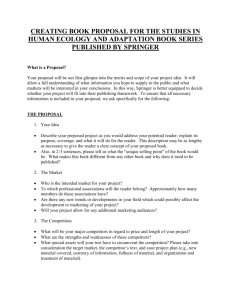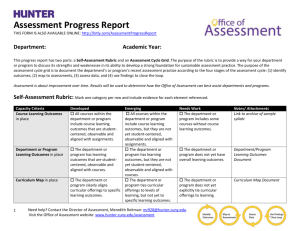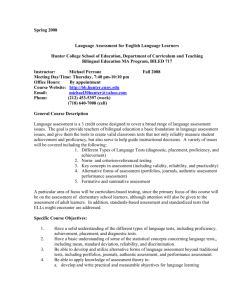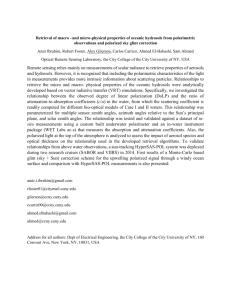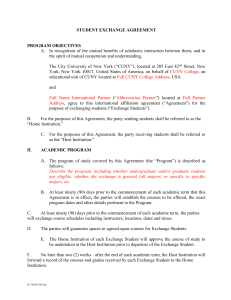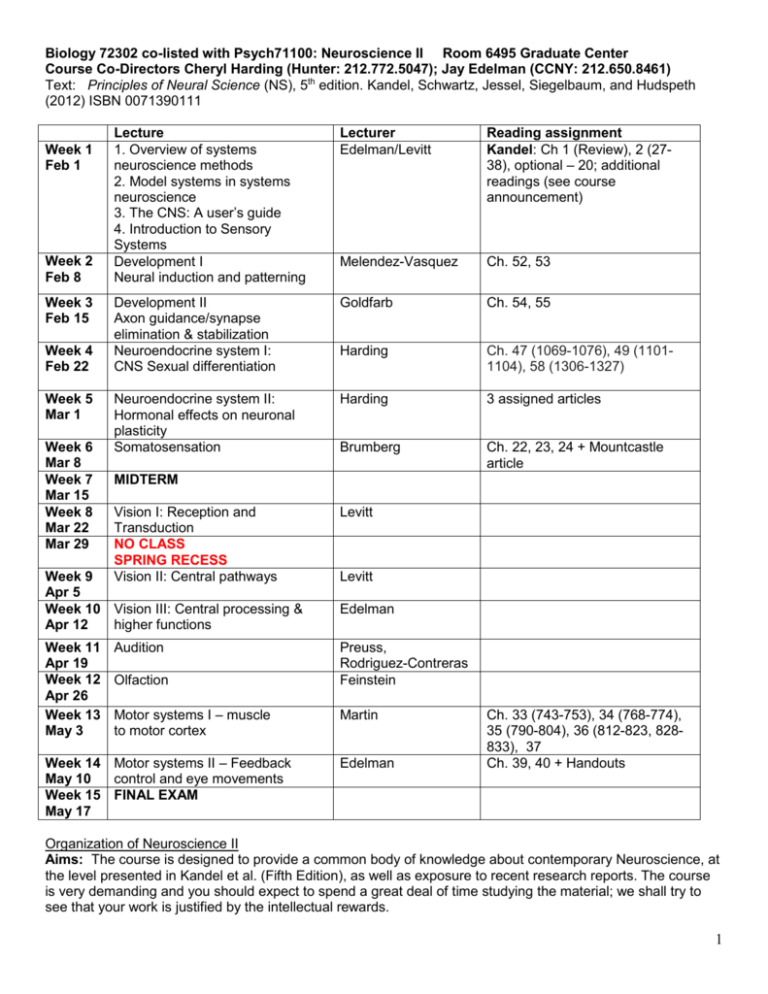
Biology 72302 co-listed with Psych71100: Neuroscience II Room 6495 Graduate Center
Course Co-Directors Cheryl Harding (Hunter: 212.772.5047); Jay Edelman (CCNY: 212.650.8461)
Text: Principles of Neural Science (NS), 5th edition. Kandel, Schwartz, Jessel, Siegelbaum, and Hudspeth
(2012) ISBN 0071390111
Week 1
Feb 1
Week 2
Feb 8
Week 3
Feb 15
Week 4
Feb 22
Week 5
Mar 1
Week 6
Mar 8
Week 7
Mar 15
Week 8
Mar 22
Mar 29
Lecture
1. Overview of systems
neuroscience methods
2. Model systems in systems
neuroscience
3. The CNS: A user’s guide
4. Introduction to Sensory
Systems
Development I
Neural induction and patterning
Lecturer
Edelman/Levitt
Reading assignment
Kandel: Ch 1 (Review), 2 (2738), optional – 20; additional
readings (see course
announcement)
Melendez-Vasquez
Ch. 52, 53
Development II
Axon guidance/synapse
elimination & stabilization
Neuroendocrine system I:
CNS Sexual differentiation
Goldfarb
Ch. 54, 55
Harding
Ch. 47 (1069-1076), 49 (11011104), 58 (1306-1327)
Neuroendocrine system II:
Hormonal effects on neuronal
plasticity
Somatosensation
Harding
3 assigned articles
Brumberg
Ch. 22, 23, 24 + Mountcastle
article
MIDTERM
Vision I: Reception and
Transduction
NO CLASS
SPRING RECESS
Vision II: Central pathways
Levitt
Week 9
Apr 5
Week 10 Vision III: Central processing &
Apr 12
higher functions
Levitt
Week 11
Apr 19
Week 12
Apr 26
Week 13
May 3
Preuss,
Rodriguez-Contreras
Feinstein
Audition
Olfaction
Motor systems I – muscle
to motor cortex
Week 14 Motor systems II – Feedback
May 10
control and eye movements
Week 15 FINAL EXAM
May 17
Edelman
Martin
Edelman
Ch. 33 (743-753), 34 (768-774),
35 (790-804), 36 (812-823, 828833), 37
Ch. 39, 40 + Handouts
Organization of Neuroscience II
Aims: The course is designed to provide a common body of knowledge about contemporary Neuroscience, at
the level presented in Kandel et al. (Fifth Edition), as well as exposure to recent research reports. The course
is very demanding and you should expect to spend a great deal of time studying the material; we shall try to
see that your work is justified by the intellectual rewards.
1
Learning Objectives
1. Provide basic understanding of organization & development of the central nervous system, and the
anatomy, physiology, and behavioral relevance of sensory, motor, and neuroendocrine systems.
2. Stimulate interest in several current areas of neuroscience research
3. Use online scientific literature databases to find journal articles on a topic
4. Develop skills for reading the primary literature in neuroscience
5. Summarize information from lectures and primary literature readings in writing with a concise
scientific style
1. Each instructor will provide study questions that define for the student those issues considered to be
central for that section of the syllabus. These questions will be given to the students the week prior to the
lecture.
2. At the start of each lecture instructors will give a quiz based on the chapters and study questions for that
day’s lecture. Quizzes will be given out at 1:05 PM and collected promptly by 1:30 PM. Quizzes are
primarily a pedagogical device to encourage reading of the material by the student and its coverage by the
instructor. Students are strongly urged to form study groups to prepare for the quizzes and exams.
3. Up to three original papers will be assigned by each instructor and covered in the examinations.
4. Each student will write a short term paper on one of the topics covered in the course. It should be based on
original research papers, and approximately five double spaced pages in length. Students should select
their topics as early as possible, preferably by the second week of the semester. Papers are due at the
time of the final exam (May 17, 2013).
5. The final grade will be determined as follows:
Midterm Examination 33%
Final Examination 39%
Quizzes 12% (lowest of the 13 quizzes will be dropped)
Term Paper 16%
Faculty:
Josh Brumberg (Queens)
Jay Edelman (City College)
Paul Feinstein (Hunter College)
Mitchell Goldfarb (Hunter College)
Cheryl Harding (Hunter College)
Jonathan Levitt (City College)
John Martin (City College)
Carmen Melendez-Vasquez (Hunter)
Thomas Preuss (Hunter College)
Adrian Rodriguez-Contreras (City)
718-997-3541 joshua.brumberg@qc.cuny.edu
212.650.8461 jedelman@sci.ccny.cuny.edu
212.650.3169 feinstein@genectr.hunter.cuny.edu
212.772.5289 goldfarb@genectr.hunter.cuny.edu
212.772.5047 harding@genectr.hunter.cuny.edu
212.650.8539 jlevitt@ccny.cuny.edu
212.650.5956 jmartin@ccny.cuny.edu
212.650.3022 melendez@genectr.hunter.cuny.edu
212.396.6358 tpreuss@hunter.cuny.edu
212.650.5899 arodrig@sci.ccny.cuny.edu
CUNY regards acts of academic dishonesty (e.g., plagiarism, cheating on examinations, obtaining
unfair advantage, and falsification of records and official documents) as serious offenses against the
values of intellectual honesty. The University is committed to enforcing the CUNY Policy on Academic
Integrity and will pursue cases of academic dishonesty according to the Hunter & City College
Academic Integrity Procedures
From the Office of AccessABILITY:
In compliance with the American Disability Act of 1990 (ADA) and with Section 504 of the Rehabilitation Act of
1973, CUNY is committed to ensuring educational parity and accommodations for all students with
documented disabilities and/or medical conditions. It is recommended that all students with documented
disabilities (Emotional, Medical, Physical and/ or Learning) consult the Hunter Office of AccessABILITY located
in Room E1124 to secure necessary academic accommodations. For further information and assistance
please call (212.772.4857)/TTY (212.650.3230)
2

